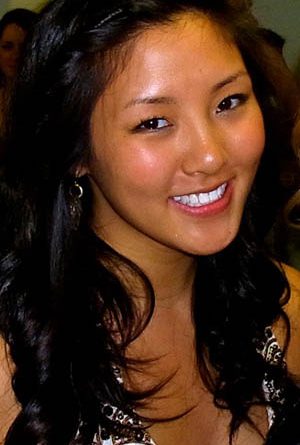Princeton University student – Sarah Chen
Princeton University is a vibrant community of scholarship and learning that stands in the nation’s service and in the service of all nations. Chartered in 1746, Princeton is the fourth-oldest college in the United States. Princeton is an independent, coeducational, nondenominational institution that provides undergraduate and graduate instruction in the humanities, social sciences, natural sciences and engineering.
As a world-renowned research university, Princeton seeks to achieve the highest levels of distinction in the discovery and transmission of knowledge and understanding. At the same time, Princeton is distinctive among research universities in its commitment to undergraduate teaching.
Meet Tigress Sarah Chen!
ASIANCE: What University are you attending?
Sarah: Princeton University, Princeton, NJ
After signing up for the Asian American Mentoring Program on another whim, I was assigned the incredible mentors Angela Wu ’10 and Mark Jia ’10, who showed me that being involved with Asian groups can be fulfilling.
ASIANCE: Why did you choose Princeton?
Sarah: The campus is gorgeous, the people are unbelievably dynamic and diverse, and I have to admit, its top ranking did make my parents happy.
ASIANCE: What is your major?
Sarah: The Woodrow Wilson School of Public Policy and International Affairs, with certificates in East Asian Studies and Environmental Studies.
ASIANCE: What will you be doing after you graduate?
Sarah: Hopefully, I will go into government service somehow. Not sure how, yet, but I won’t let that stress me out too much now.
ASIANCE: What clubs or extracurricular activities do you enjoy? If Asian specific, why did you choose to join?
Sarah: I’m the “Pledge Mom” for my sorority, Kappa Alpha Theta–in high school I would NEVER have considered joining a sorority, but spontaneously deciding to rush was the best decision I’ve made at Princeton! After signing up for the Asian American Mentoring Program on another whim, I was assigned the incredible mentors Angela Wu ’10 and Mark Jia ’10, who showed me that being involved with Asian groups can be fulfilling, fun, and not at all limiting. I’m now a co-president (with Charlie Zhang ’13) of the Asian American Students Association, senior coordinator of the Asian American Mentoring Program, and part of the organizing committee for the Ivy League Asian American Students Conference in November. I am also a social chair for the club ski team, a staff writer for the newspaper, and member of an environmental student group.
ASIANCE: What is the hardest part about being a student?
Sarah: “From reading too much, and sleeping too little, his brain dried up on him and he lost his judgment.” Don Quixote by Miguel Saavedra de Cervantes.
ASIANCE: What are you looking forward to the most about graduating?
Sarah: I want to take a little time off to do random, unique things like volunteering in a sloth sanctuary in Costa Rica and backpacking the entire length of the Great Wall, which I’m not sure is even possible. Ideally, though, the best part about graduating will be having a job that I’m passionate about.
ASIANCE: What will you miss about not attending school?
Sarah: Being around such interesting people 24/7.
ASIANCE: Was there another school you wanted to attend?
Sarah: I wanted to go to Yale, didn’t get in, and am unspeakably thankful that I didn’t.
ASIANCE: Where do you see yourself in 5 years?
Sarah: Unfortunately, in grad school.
ASIANCE: Where do you see yourself in 10 years?
Sarah: Taking calls from the White House. Proud owner of two dogs and a cat.
ASIANCE: Any significant accomplishments you would like to add during your time in college?
Sarah: Writing a 3000-character Chinese research paper–not something I ever thought I’d be able to do!
ASIANCE: Looking back would you do anything differently?
Sarah: Who in college doesn’t have a few of those nights?
ASIANCE: Was there anything hard about being Asian at your school?
Sarah: One of Princeton’s richest traditions is that of the eating clubs–private, co-ed houses where the majority of juniors and seniors pay dues to have their meals instead of buying a university meal plan in the dining halls, joining a co-op, or independently getting your own food. The clubs are also a social hub, opening on tap every few days and throwing large parties every few weeks. There are currently 11, 6 of which implement a selection process called bicker and 5 of which accept any students if they sign up. While the six exclusive “bicker” clubs have very few Asian members, one of the sign-in clubs has a reputation for being “too Asian.” Some Asian students will feel, then, like they either have no chance bickering an exclusive club or are pigeonholed into a club simply because of their heritage. As the sole member of Chinese descent in my bicker club of 180 members, I want to help younger Asians with the eating club scene as much as I can.
ASIANCE: What advice would you give to girls who are looking at colleges right now?
Sarah: Do what you love, but also do what you think you might continue through college and the rest of your life. In high school, I played flute and loved it, but now I never have time to play. In retrospect, I wish I had participated in groups like Model U.N. and even the debate team, because I probably would have enjoyed them then and would now have some pertinent experience to use in college.
Also, don’t dismiss a school on your first judgment. I hated Princeton on my first visit, mainly because it was raining. Now, I can’t imagine being anything but a Tiger.


